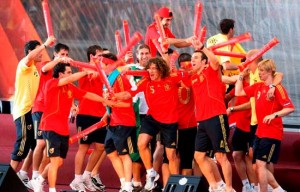
When the Spanish football team touched down at Barajas airport with the World Cup trophy on July 12, there was a curious sight amid the jubilant reception. As the players descended the steps onto the runway, Carles Puyol and Xavi Hernández, two of the team’s key members, did so carrying their belongings wrapped in a Catalan flag. While Iker Casillas held the trophy aloft as he led his team past cheering airport staff and the press and onto a waiting bus, Puyol and Xavi looked ever so slightly timid as they together lugged their gear –and the senyera flag– across the tarmac.
It could not detract from what was a highly moving scene for any Spanish fan, but it was a reminder that while the World Cup victory was a masterclass in bringing together talents from across Spain, it can not hide the fact that the regional identity of many of these players –perhaps most notably the many Catalans in the squad– is hard to ignore, as are tensions between Madrid and Barcelona.
The temptation in the wake of Spain’s historic win on July 11 was to project a kind of “Rainbow nation” light onto the team. However absurd it may seem, the comparison was there to be made with the French champions of 1998: a team containing the children of Algerians, Armenians, West Indians and West Africans. This time, the rainbow was made up of the colours of the Basque, Andalusian, Madrid and Catalan flags, among others.
One Barajas airport employee who was waiting for the World Cup heroes to return told Qorreo: “I hope and trust that the Spanish flag unites us. If we have to achieve that through football, then I hope we can do it. I would like us to manage that through something other than football, but if it’s through football, then blessed be football!”
But how can football unite Spaniards, when the day before the World Cup final, several hundred thousand Catalans marched through the streets of Barcelona to protest Madrid’s judicial meddling in their affairs? The French experience offers a cautionary tale here. In 2001, just three years after the historic World Cup win, supporters booed La Marseillaise before a game between France and Algeria in Marseille. The sight of burning cars in France’s banlieues in recent years is a further reminder that football is not a magic wand when it comes to political and racial harmony.
All of which does not necessarily mean that something has not shifted in how Spain and its regions see themselves. The appearance of the national flag, hanging from windows, cars and bars on such a scale is a new phenomenon (although, interestingly, there seem to be substantially fewer flags in Madrid in the wake of the World Cup than there were in Lisbon following Portugal’s hosting of the 2004 European Championship).
Patriots come out of the closet
But the real novelty was the brandishing of the Spanish flag in Catalonia and the Basque Country. One Spanish fan told Qorreo: “In the regions such as Catalonia and the Basque Country, it’s quite likely that people who are Spaniards but who didn’t dare say so have come out of the closet. It’s been a sort of revolution, during which we’ve seen lots of people hanging Spanish flags from their windows in those regions and they’re so happy that they just don’t care.”
This “revolution”, of course, will only last as long as Spain keeps winning. Catalan fans, meanwhile, might be less enthused if the balance of the squad tips towards players from Madrid, rather than Catalonia.
Looking ahead a decade or so, the parallels with France will be all the more fitting for Spain when its national squad contains for the first time players born of Ecuadorian, West African and Romanian parents.
Charles de Gaulle once said of France: “How can you govern a nation that has 246 varieties of cheese?” Coach Vicente del Bosque has resolved the Spanish version of this conundrum, winning the World Cup in superb style. The country as a whole has celebrated its triumph with the spirit of true champions. Talk of closing the country’s deep regional divides through feats on the football pitch may be a goal too far, but in the meantime, why not enjoy a rare moment of unity?
We are catalans, not spanish. And Im saying this with respect becouse there is lots of people that they come from Spain and they only want speak spanish and they want spanish rights, still if the society vote for catalanist politic parties and catalan rights.
My familiy, from Madrid is an exeption becouse they love Catalonia. The fact is that this problems are related directly with the war where the dictator franco invaded Catalonia when we declared independence again. And more than 30 years after the death form the dictator, Spanish gvt don't want to recognize the murders still knowing that franco was a friend of hitler.
We are a banned majority of catalans and we are fighting pacificly for owr rights of autodetermination and be able to play owr democratic referendum of independence. In short time you will hear about us…
We will be the next state of Europe!!*!!
From Catalonia with respect and peace.
"Less flags" has been changed to "fewer flags" after the error was spotted by an eagle-eyed reader. All the heady celebrations must have affected my grasp of English…